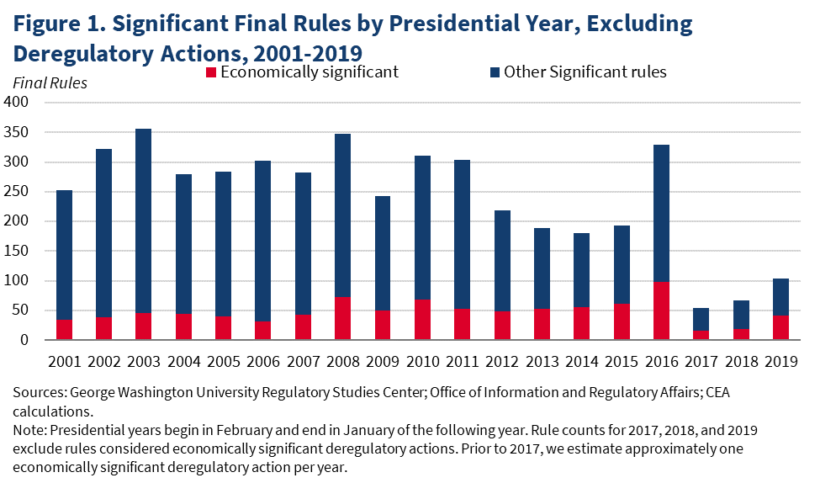Throughout his presidency, President Trump has promoted economic freedom for the American people by eliminating excessive burdens imposed by the regulatory state. This week marks one year since the creation of the Governors’ Initiative on Regulatory Innovation which aims to better align local, state, and federal regulations by cutting costs and advancing occupational licensing reform.
Last year alone, the Administration far surpassed its promise of removing two existing regulations for each new regulation as it issued 150 deregulatory actions and just 35 new significant regulatory actions, unleashing massive benefits for the American people. As shown in Figure 1, new regulations have fallen dramatically during the Trump Administration.

The Council of Economic Advisers has previously estimated that the slower pace of new regulations in combination with a subset of deregulatory actions taken between fiscal years 2017-19 will raise real incomes for U.S. households by $3,100 per year once fully implemented. Furthermore, CEA estimates that the Safer Affordable Fuel Efficient (SAFE) Vehicles Rule would increase the real incomes of Americans by $53 billion per year, or $416 per household, over the 2021-2029 period. Additionally, we find that the SAFE Vehicles Rule will reduce costs incurred by car manufacturers and consumers by $26 billion per year, and will result in the production of 300 thousand more new vehicles every year at a similar total cost. When CEA analyzed the Council for Environmental Quality (CEQ) reforms to the National Environmental Policy Act (NEPA) in 2020 in combination with the One Federal Decision EO (13807), which both provide more certainty and speed up environmental impact analysis, we estimate these reforms will likely generate economic benefits worth billions of dollars in the coming years.
Since the onset of the COVID-19 pandemic, the Administration has taken swift and vigilant deregulatory actions to help the American people weather the difficulties the pandemic has imposed. If these actions are continued and expanded upon, they could generate further additional benefits. For example, CEA estimates that the total value of more widespread adoption of telemedicine would be approximately $325 billion per year. Reducing FDA approval times by relaxing overly burdensome impediments to drug development would have a net present value of $1.9 trillion if approval times are sped up by one year, $3.9 trillion if sped up by two years, and $5.9 trillion if sped up by three years. Expanding occupational licensing deregulation for nurse practitioners nationwide could result in $62 billion in cost savings for patients annually. The Trump Administration remains committed to rolling back regulations and lifting up American families and businesses through its regulatory relief.
